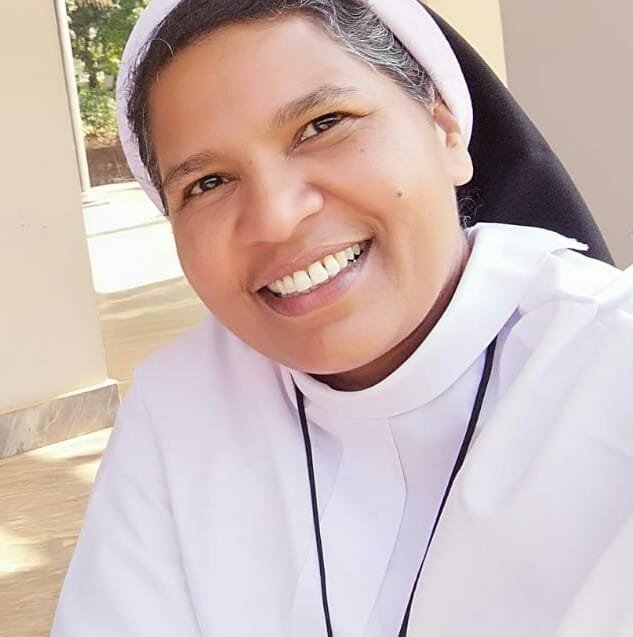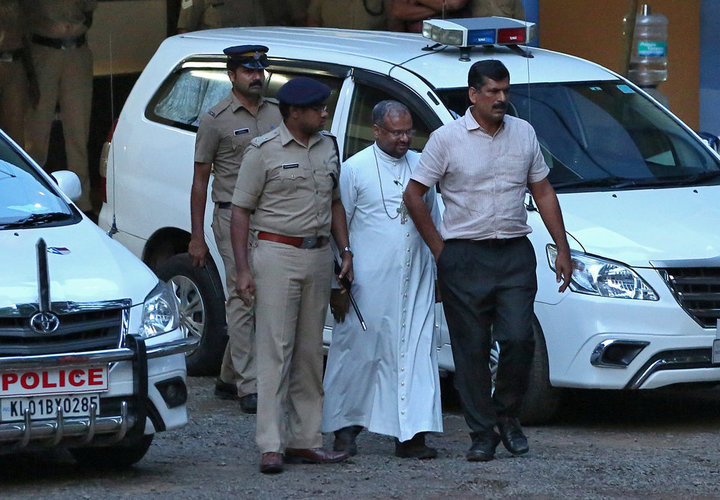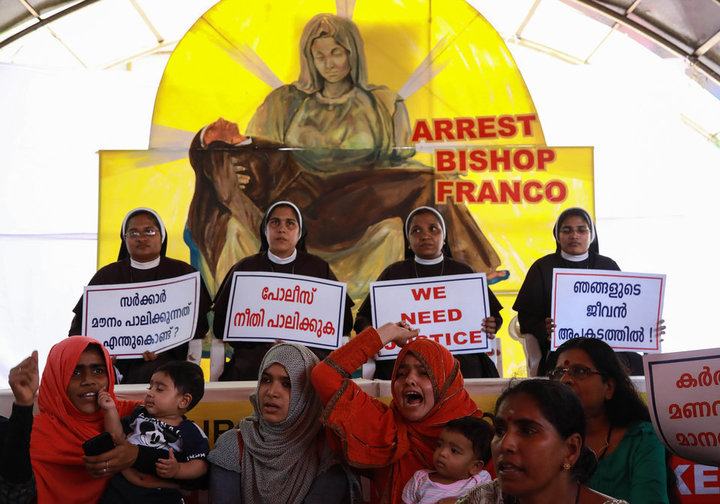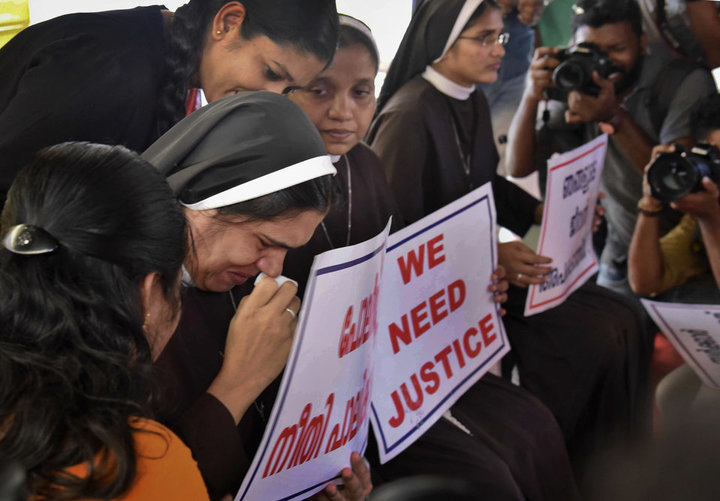This Nun Is Fighting to End Sexual Abuse in India’s Churches Despite Threats
By Piyasree Dasgupta and Meryl Sebastian
When Bishop Franco Mulakkal returned to the Jalandhar diocese in October after spending 21 days in jail, his supporters welcomed him back with massive garlands and showers of rose petals. As images of the hero’s welcome given to the rape-accused priest filled her TV screen and social media timeline, something snapped in sister Lucy Kalapura. The 52 year old, who has been a nun for more than three decades, had often heard stories of powerful men of the cloth sexually abusing women and sometimes children. But the Mulakkal case shook her. “I couldn’t believe how relentless it was. I heard the man raped her 13 times,” Kalapura told HuffPost India. It was in June 2018 that a nun from a convent in Kottayam’s Kuruvilangad filed a police complaint, accusing Mulakkal of sexually abusing her multiple times between 2014 and 2016. As news of the assault broke, a few nuns from the survivor’s congregation, the Missionaries of Jesus, began protesting, demanding that action be taken against Mulakkal. Kalapura waited, expecting more women from convents to take to the streets to demand Mulakkal’s arrest. “Forget the Bishop being arrested, I realised more and more women were going against the nun who complained,” said Kalapura, who belongs to the Franciscan Clarist Congregation.
So first, she posted a flurry of enraged status updates on Facebook, demanding that the woman get justice. She didn’t feel like that was enough, though. Without waiting for anyone else to join her, Kalapura landed at a protest site where some civil society organisations were demonstrating against the bishop. On 8 September, five nuns began protesting outside the Kerala high court. Kalapura also took part in the protests, which soon gained national attention, increasing the pressure on the Kerala government to act. Mulakkal was arrested, jailed for three weeks, released on bail and is now back at the Jalandhar diocese, the headquarters of the Missionaries of Jesus congregation. The nuns who fought for his arrest have been heckled, isolated and face the threat of actionby their superiors in the church. In the past four months, Kalapura has received two notices from her convent, accusing her of not following the ‘principles of religious life’ and allegedly violating the rules of the congregation.The first was served around Christmas last year, but that did not deter her from rallying behind the rape survivor with social media posts and comments to the press. So on 9 January, the convent served her another notice—this one, she said, contained a thinly-veiled threat of expulsion. Act of courage The powerful Catholic Church has long been accused of shielding priests who have sexually abused minors and women. An AP investigation published earlier this year uncovered a decades-long history of Indian nuns enduring sexual abuse from within the church. Nearly two dozen people AP spoke to said they had direct knowledge of such incidents. The extent to which Kalapura and the five nuns have risked their livelihoods and personal safety is evident from the fact that several male priests are afraid to speak up against Mulakkal and the church, even if they want to support the protests.
One priest from Kerala shared with HuffPost India a letter he received from higher authorities in his congregation after he attended a protest organised by nuns in the state. The letter ‘warns’ the priest of disciplinary action if he participates in public demonstrations again. “I am helpless, and like me, many are helpless as well,” he said, requesting that his name be withheld. Despite receiving multiple such warnings, Kalapura has soldiered on. “She is a martyr,” said Sister Jesme, a former nun who quit her convent in Kerala in 2008 and then published a controversial book called ’Amen: The Autobiography of a Nun’, accusing the church of multiple malpractices. “She is still a part of the convent and waging a war against them. That needs incredible courage. Even when I wanted to, ten years back, I couldn’t gather the courage to speak up while being a part of the system,” Jesme told HuffPost India. Social life in Christian communities in Kerala, Jesme pointed out, is closely tied to the church. In fact, it is often difficult to separate the threads of social life from the community’s religious life, making the act of opposing the church a life-altering decision. “When a child is born you go to the church, marriages are held in the church, christening is done in the church, people bond over church fairs and sales, during holidays also you go to the church, literally everything is centred around the church. Going against the church means going against family, friends and everyone you know and care about in our case,” Jesme said. Anto Kokkat, member of the Kerala Catholic Reformation, an organisation which has helped organise several protest meetings, told HuffPost India that the implementation of the Church Act would prevent churches from welding disproportionate amounts of power and make congregations safer for women. The Act, which most political parties have refrained from touching and several Christian civilian groups want implemented, gives the government power to regulate the land owned by churches.
Church vs freedom Kalapura, one among 11 siblings, joined the Missionaries of Jesus at 17. She had just finished school and joining the church seemed like a legitimate vocation. However, as the years passed, a number of things about the church’s discipline began troubling her. She was careful, though, to never mention them to anyone. Then in 2003, said Kalapura, something “terrible” happened— she wouldn’t reveal what this was— and she found that the only way to cope and heal was to scribble her thoughts down. She began by writing accounts of how she dealt with difficulties and moved on to composing short poems about nature and how she realised ‘god lives in nature’. Later, as the years passed and the restrictions of the convent began chafing, she also began jotting down her thoughts on love, marriage and life. All this was merely a process of catharsis until 2016, when some close friends suggested Kalapura should publish her poems in the form of a book. “I began asking for permission in 2016 and some financial help to publish the book. But I was refused both,” she said. “These were simple poems on nature and God, but I was told that this goes against the rules of our lives as nuns.” Kalapura spent two years trying to convince the convent to reconsider their ‘disciplines’ and allow her to publish the book of poems—they didn’t budge. So, in March 2018, she published her book despite their remonstrations. “Soon, I started getting calls and letters from the provincial (the nun in charge of the convent). I had also bought a car and learnt driving despite them forbidding me to do so. I tried explaining I needed the car to travel for work and the writing is an act of self-expression for me. However, I don’t think the sister absorbed what I said,” she told HuffPost India. A few months later, when Mulakkal’s case came to light, Kalapura said she could relate to the isolation faced by the survivor and the few women supporting her. “I wear a habit (nun’s dress) too and it would be inherently dishonest of me if I did not support them,” Kalapura said. Jesme recounted the years that she spent in her own convent trying to ask questions and wondered how “unbearable” it must be for Kalapura to carry on protesting while being a part of the convent. “How must the other sisters treat her, with indifference and hostility. It is so difficult to be inside and rebel,” she said, adding that she hoped Kalapura’s actions gave other women courage. Power and abuse In Amen, published by Penguin in 2009, Jesme wrote extensively about how disillusioned she was by malpractices within the church, including sexual abuse and money laundering. Sexual abuse, she told HuffPost India, was normalised to such a degree that men and women in power often convinced survivors that keeping quiet was somehow doing service to ‘god’. “Sometimes, the priests who are all powerful, they get ample people from the nunnery—either forcefully or with their consent. If they don’t agree, these priests will say, ‘oh, this is something holy, we should keep this secret, whatever sin happens you confess to me, I will give you absolution, I’m a priest’,” Jesme told HuffPost India. Sometime in the mid-90s, a priest in Bengaluru approached her with a similar proposition. “He said, ‘confess to me’. I didn’t,” she said. Jesme suspects that Mulakkal may have emboldened other priests to pursue women in that manner. “I am sure a lot of nuns have been victimised by the same men, but they are afraid to speak up. There’s a pattern,” said Jesme. “Such things are happening everywhere. Often, even when you complain to senior sisters, they’re told that just like Jesus suffered, they must also suffer.” The 62-year-old nun said how she would often share her questions with her seniors, but instead of being reassured, she was told that people are simply following ‘god’s will’. “I went raging with questions, came back like a lamb,” she added. Kalapura said that the few times she had spoken to the survivor, she had come across as a woman of great strength. “I wanted to meet her but wasn’t able to. But we speak on the phone occasionally. She has a lot of difficulties, but she isn’t the kind of person to talk about it too much, and I haven’t asked her too much either,” she said. While Jesme seems to pin the allegedly never-ending cycle of abuse in churches to the fact that many join the services because they need jobs and not because they are interested in spirituality, Kalapura believes that many people join the convent at a very young age and later realise they have different desires. One of her several journal entries, Kalapura recounted, was about how a person should embrace this life of abstinence only once older and fully aware of what that implied. “Times are changing. There are cultural changes as well. Since times have changed, it is time to think about marriage and priesthood as well, if there are priests and nuns who want to get married, they should. “When they get married and have a couple of children, they’ll know what life is,” Kalapura said. She also said that the church should understand that ‘sexuality is a gift of god’ and shouldn’t deny its workers the right to love. In fact,she added, it was sexual repression that fed the culture of sexual exploitation. “These men preach abstinence but can’t follow it, then use their power to fulfill their needs. How many women must he (Mulakkal) have oppressed?” she said. Jesme, however, believes that the sexual predators within the confines of the church are deeply aware of their position of privilege and exploit it for sexual and material gains. “When I started speaking up, I was immediately labelled insane. In fact, people in my convent started telling my mother to send me to a church retreat for my ‘mental issues’. My mother, though aghast by me, refused to let me go,” she said. For years, her family excommunicated her, only calling once or twice a year to ascertain where she was living. “They are ashamed of me,” said Jesme.
|
.
Any original material on these pages is copyright © BishopAccountability.org 2004. Reproduce freely with attribution.



